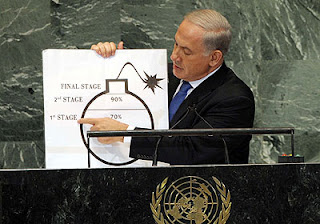The United Nations General Assembly will vote today to accord Palestine upgraded Observer status as a non-member state. Had the U.S. Congress been more supportive of the Oslo process following the assassination of Yitzhak Rabin, had the international community exerted more pressure on Yasser Arafat, had Shimon Peres called earlier elections to capture the Rabin sympathy vote, had President George W. Bush not insisted on early elections in Gaza that put Hamas legally in charge there, this might have happened ten years ago, and with full membership for Palestine. But that's not what happened.
So today, on the anniversary of the UN's 1947 Palestine Partition plan, Palestinian leader Mahmoud Abbas is calling on the UN to recognize Palestine as a state. Some of the normal prerequisites for statehood status remain unfulfilled: There are no permanent, recognized, demarcated borders; the territory is ruled by two different governments; and the terms of the Oslo Accords mandate the Palestinian and Israeli sides to cooperate and agree on final status, including statehood.
But realistically, Oslo has been dead for several years, and certainly since President Bush backed off serious efforts to facilitate progress between the two parties. Realizing this, Ehud Olmert, Israel's Prime Minister at the time, continued his own regular meetings with Abbas and even followed through on Ariel Sharon's planned unilateral withdrawal from Gaza. And today,
Olmert himself is backing the Palestinian bid. For his part, Israeli Prime Minister Benjamin Netanyahu has done little to back up his public calls for Abbas to return to the negotiating table, while expanding Jewish settlements across the West Bank and empowering Hamas while generally ignoring Abbas.
Especially following the recent conflict between Israel and Hamas, and the Egyptian-brokered ceasefire, Abbas needs to proceed with today's vote. He needs to show something to remain relevant, and Israelis who retain any hope for eventual peace should realize that they need Abbas to succeed over Hamas, in the West Bank as well as Gaza.
While today's vote is not a vote against the existence of Israel, it definitely has an element of rejecting Israeli settlement expansion and U.S. neglect of proactive diplomacy. There are no guarantees, and today's vote may be ill-timed. And it will be used by Iran and others to cynically advance their campaign to isolate Israel diplomatically and otherwise. But the Palestinians will get their way today, albeit without the support of Israel or the United States. Given this reality, where do we go from here?
Israel and the United States have already decided to downplay the statehood status. This is more constructive than just cursing the darkness, but far from lighting a match. A year ago, the last time Palestinian statehood was being advanced at the UN,
I blogged on how much easier it would be for Netanyahu to just work on peace negotiations with Abbas, both substantively and tactically as a way to undermine or forestall any statehood effort.
Even Netanyahu, and his coalition partners who more openly reject any territorial compromise, can reap some advantage from today's fait accompli. They can begin treating Abbas as the leader of a state -- not with ticker-tape parades through Tel Aviv, but by signing more formal agreements from economic relations to security cooperation and holding him more accountable for results. They can play up his role as the internationally recognized leader rather than giving Hamas more opportunities to escalate tensions and overshadow Abbas.
We can also use this as an opportunity to get more economic development and investment into the West Bank, by calling on European governments voting "yes" on statehood to put their money where their mouths are. Any effort to penalize Abbas for pushing the statehood issue will further erode his credibility and that of the peaceful path (Hamas has shown that terrorism gets better play with Israel). Israel needs a strong, vibrant, secure and prosperous Palestinian neighbor, and this is according to Prime Minister Netanyahu himself.
Jewish organizations should feel free to condemn and criticize today's vote, but afterward they should also be held to account. If we as a community reject unilateral measures, and we claim that today's vote undermines the path of direct negotiations and a two-state solution, what will we be doing in 2013 to achieve that oft-stated goal? Are we willing to back up our own rhetoric with candid advice to Israeli leaders, with our own funds to support Israeli-Palestinian cooperative enterprises, and to promote genuine dialogue and engagement between Jews and Palestinians?
As Jews prepare to celebrate Chanukah, the Festival of Lights, we should consider whether we will continue to curse the darkness, just keep quiet, or start lighting flames to brighten the room we call the Middle East. If we as a community are not up to that task, then silence may be the best answer going forward. Merely paying lip service to a "two-state solution" can no longer help Israel or the Palestinians, and it won't stop Iran from achieving nuclear-blackmail capability.






